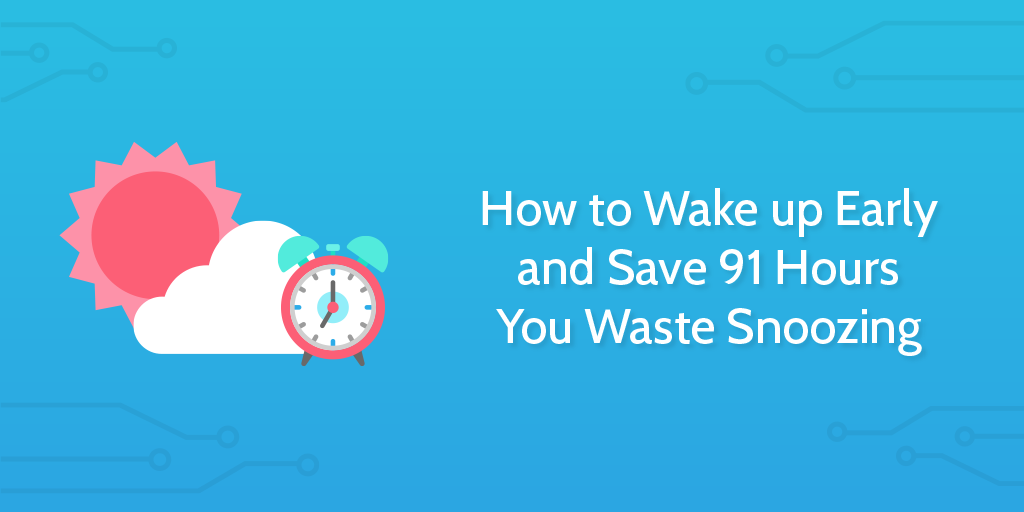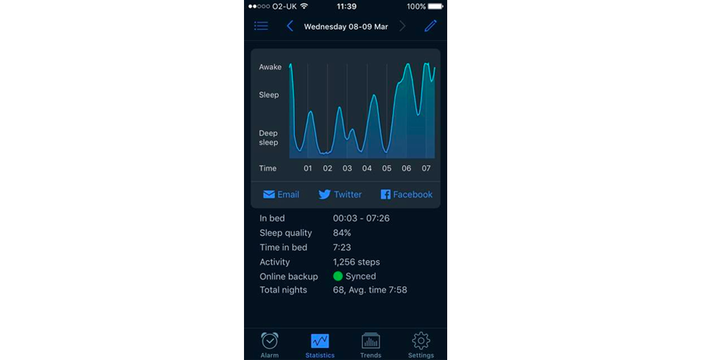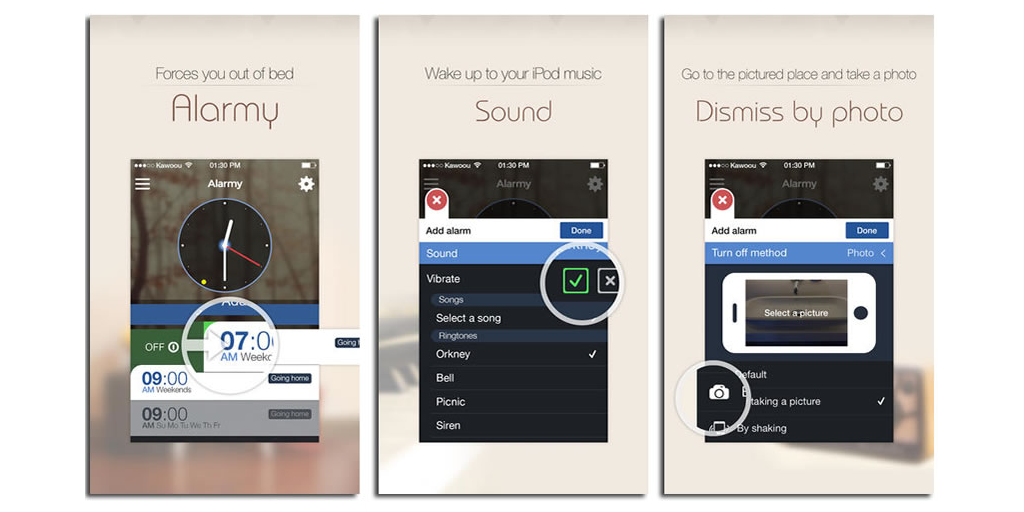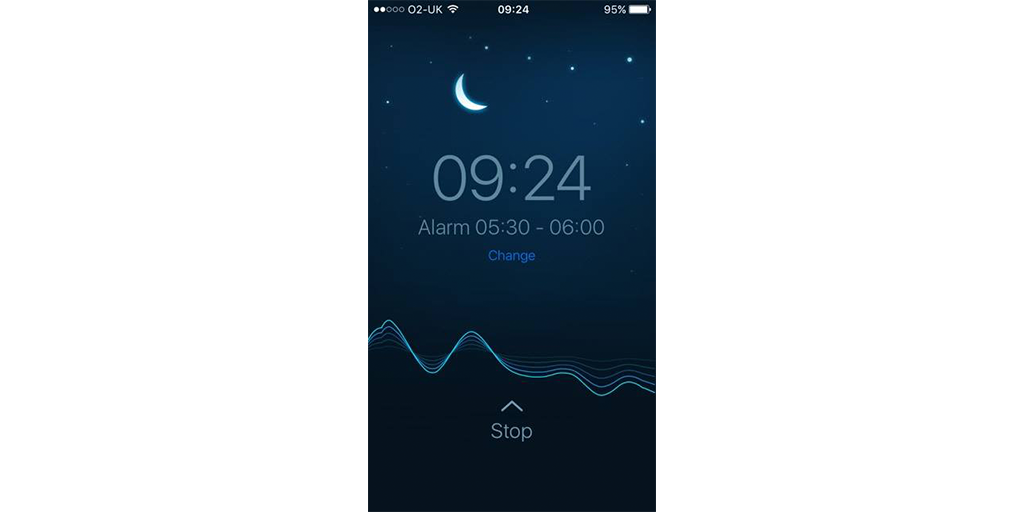
Alarm goes off. “Five more minutes”. Snooze. Sleep. Repeat until you’re late.
Ignoring your alarm repeatedly creates a habit, and habits are hard to break. You start to ignore it more and more because you’ve conditioned yourself to do so. Even if you want to get up early, your subconscious is working against you.
Small snoozes quickly add up too – just 15 minutes each day sends 91 productive hours down the drain every year. That’s more than two working weeks you waste each year.

Knowing how to wake up early is only half the battle – to start your day the right way, you need to make it an automatic reaction to your alarm.
To do this, you need to know and do the following:
- Know why you’re tired
- Get the right tool
- Plan a todo list for how to wake up early
- Practice
- Stick to your time until it’s automatic
- Be realistic (don’t beat yourself up)
- Make it part of your daily routine
No more snoozing – it’s time to get up early and make the most of your day.
Know why you’re still tired (and fix it)
For more than a decade I woke up using several alarms over the course of an hour. I told myself that I was getting more quality sleep since I was napping for 20 minutes three times over. In reality, all I did was practice ignoring my alarm.
After looking into what causes morning tiredness, though, it’s easy to see why snooze is so tempting.
Drinking caffeine
There are some obvious factors, like drinking caffeine (tea, green tea, coffee, soda, etc) within six hours of going to bed. This can do anything from making your sleep fitful to flat-out preventing it.

Eating big meals
Eating big meals before bed is another common mistake since your stomach takes around three hours to fully empty. Sitting upright or standing encourages good digestion (the wonders of gravity), which is crucial to absorbing nutrients. In other words, don’t eat heavily within three hours of bed.
Using technology and blue lights
Blue light suppresses melatonin, which controls your circadian rhythm (your sleep/wake cycle), so both blue lights and screens (phones, TV, tablets, etc) are another thing to avoid. This takes about 30 minutes to right itself though, so feel free to unwind with tech in the evenings – just don’t use your phone straight before sleep.

Getting enough sleep
Obviously you also need to get enough rest, with 7-9 hours per night being recommended. Don’t think you can scam yourself by sleeping less and making it up at the weekend either – sleep debts don’t work like that. To make up a debt of a couple of hours, you’ll need to sleep more at the weekend and also go to bed an hour earlier the week after.
To sum up, the first step to knowing how to wake up early is:
- Don’t drink caffeine within six hours of bed
- Don’t eat large meals within three hours of bed
- Don’t use tech (or be near a lot of blue light) for a half hour before sleeping
- Get a solid 7-9 hours per night
Once you’ve eliminated those main factors for groggy mornings, it’s time to gear up to wake up early.

Choose your alarm clock (or app) to wake up early
Your alarm isn’t overly important for the method I’ll go over later, but you do need to pick your poison. You can use anything from the standard alarm clock to the latest high-tech app or dedicated sound system, but the important thing is that it’s reliable and that you won’t forget to set it.
Having said that, there are two apps I’d recommend giving a go on Android and iOS.
Sleep Cycle is great for data junkies
Sleep Cycle is what I currently use, and it’s great for tracking your sleep. By linking to your microphone, Sleep Cycle tracks your breathing from the moment you set an alarm, then uses that to log your sleep pattern. This includes:
- How deep your sleep was over the course of the night
- What times you got into and out of bed
- How long you were in bed for
- Your average sleep quality
- How many steps you made during the day (between Sleep Cycle sessions)

This means that you can see how well you’ve been sleeping, and when you might be building up a sleep debt. You can also compare your averages to those of countries around the world, which is a nice little extra. Unfortunately, you do have to remember to set the alarm every night – there’s no option to set it in advance.
Alarmy is harsh, but effective
Alarmy doesn’t have the fancy sleep tracking but instead goes for a hard love approach to waking you up. First you’re given a couple of options for how to turn off the alarm – “default” (dismiss it as usual), by taking a picture, by shaking the device, and by solving a math problem. The final choice is both brutal, and effective.
Choose the number of problems you want to solve and their difficulty, then wish your waking self the best of luck. When the time comes you’ll have around 20 seconds to solve each problem, otherwise the alarm goes off again and you have to solve a whole new set.
However, if you guess wrong the timer resets, meaning if your tired brain can’t handle math, you can give yourself extra time by guessing anything.

Alarmy may be harsh, but that hard line can be brilliant for breaking your old habit and waking up earlier – you can also set repeating alarms over the week and weekend, so you don’t have to worry about remembering to set it every night.
I’d recommend trying out Sleep Cycle but switching to Alarmy if you need a little extra encouragement.
Set out your ideal wake up routine
You’ve cleared the physical problems and you’re equipped with your alarm. However, the real secret to waking up earlier is following a morning routine.
Don’t over-complicate things with checklists or diagrams – the whole process should happen fast enough that you don’t stop to think. Grab a piece of paper and write out what you want to happen in the morning. It should look something like this:
- Alarm goes off
- Instantly turn it off
- Sit up straight away
- Stretch
- Get out of bed
- Get dressed (or whatever you do first thing, like get a shower)

The key with your wake up routine is to get out of bed as soon as you can after your alarm goes off. More than that, nothing should take any real thought – you need to be able to run through the whole thing so easily that it becomes automatic.
This is why, despite being very effective, Alarmy isn’t my first pick of alarm app. Having to solve a math problem to turn off the alarm is okay, but unless you absolutely need that push it can put a serious dent in your morning flow.
Practice until it’s automatic
Skills are improved through practice, and the same is true when learning how to wake up early. By teaching your subconscious what to do through repetition (kind of like muscle memory or workflow automation) it doesn’t matter if you’re motivated to get up or not – by the time you stop to think, you’re already out of bed.
Set aside a half hour or so when you’re wide awake to practice the wake-up routine from earlier. You might feel silly, but replicate your sleeping conditions as closely as you can.
Dim the lights, close the curtains, put on your pajamas, set your alarm (for a minute or two ahead), get comfy in bed, and close your eyes. Then, as soon as your alarm goes off, follow your routine – turn it off right away, sit up, stretch, get out of bed, and get dressed.

Congratulations – you completed your first rep. Just like at the gym, try to go through a couple of these each time you practice (5-10 each session, once or twice a day).
The aim is to practice until your response is automatic. There’s no solid time frame for this, but it will probably take about a week to ingrain. It might seem like you’re wasting time, but even a couple of reps a day will make a huge difference in the long run.
Then, when you actually go to sleep, do the exact same thing – it’s your end-of-day test to see how you’re coming along.
When you can follow your routine without thinking, that’s a good sign that your subconscious is starting to pick up on the new routine. You’re taking motivation out of the picture and letting your autopilot do the difficult work.
Stick to your time until it’s set in stone
You’ve just created a new habit by repeating your routine, but to make sure it sticks you need to keep it up. The longer you stick to it, the easier it will become, to the point where staying in bed will be more difficult than getting up.
Break your routine and you’ll weaken the habit, giving your subconscious a way out of waking up early.

As such, try to stick to getting up at the same time (with the same routine) for a month, including weekends. Lie-ins are tempting but, again, letting things slip two days a week will only make it harder to get up on the other five.
Having said that, it’s not the end of the world if you stumble – just make sure to get back into your routine as quickly as you can. If needs be, just practice during the day again to give yourself a boost.
Be realistic (don’t beat yourself up)
After you’ve had around a month of success, feel free to be a more flexible with your wake up time. Don’t go crazy, but about a half hour either way of your original time should be fine without needing to adjust anything.
Going beyond a half hour difference will be difficult, and could even start to break down your routine a little, so get back to your original time as quickly as possible. You could even practice some more to get back into the flow.

However, there will be times when waking up at the same time just isn’t viable. Maybe you’re jet lagged from traveling a long way, maybe you’ve got an early meeting with someone from a different time zone, or maybe your kids (and you by extension) are going through a sleepless patch.
Don’t beat yourself up about missing your goal – doing this will only make the punishment part of your routine whenever you miss another one. Instead, know that sometimes life gets in the way and go back to your regular routine as soon as you can. If you find it hard to go back, go ahead and do a little more practice.
Make it a part of your daily routine
Knowing how to wake up early with your alarm is all well and good, but there’s no point in doing so if you don’t take advantage of that extra time. To do that, you need to set yourself another habit – that of a daily routine.
While this doesn’t have to be anything complicated, you should consider recording your daily routine in a checklist app or documented process to make sure that you can track your progress, with points such as:
- Eat breakfast (it’s easy to skip, but vital to being more productive)
- Exercise (jogging, swimming, etc, is a brilliant set up to work)
- Prioritize tasks for the day
- Take breaks
- Spend time with family

Try out our own premade Daily Routine checklist to get started. We looked at the routines of success stories like Barack Obama and Richard Branson to create this free and ready-to-use checklist, but you can also edit it to suit your needs.
Stop procrastinating and start making the most of your mornings – once you start, you won’t look back.
What’s your method for waking up early? Have any app suggestions or tips? I’d love to chat in the comments.







Ben Mulholland
Ben Mulholland is an Editor at Process Street, and winds down with a casual article or two on Mulholland Writing. Find him on Twitter here.